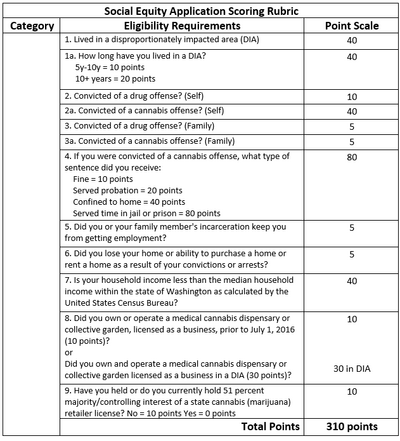Washington Cannabis Social Equity FAQs

After ten years of cannabis legalization, Washington is poised to establish a social equity cannabis program. Social equity applicants who qualify have the opportunity to obtain cannabis retail licenses from the Washington State Liquor and Cannabis Board (WSLCB). This post focuses on the WSLCB’s draft rules, which may undergo some revisions prior to implementation, but form a framework for regulations that could go into effect by the end of the year.
What are the Qualifications for Washington Cannabis Social Equity Applicants?
At least 51% majority or a controlling interest in the applicant must be held by a person or persons (meaning actual human beings not business entities) who have lived in state for the previous six months to the application date and meet at least two of the following qualifications:
- Lived in a disproportionately impacted area (DIA) for five years between 1980 and 2010
- The applicant or family member has been convicted of a cannabis offense, or
- The social equity applicant’s household income in the year prior to submitting the application was less than the median household income within the state of Washington as calculated by the US Census
The draft rules define DIA as follows:
“Disproportionately impacted area (DIA)" means a census tract within Washington state where community members were more likely to be impacted by the war on drugs. These areas are determined using a standardized statistical equation to identify areas of high unemployment, low income, and demographic indicators consistent with populations most impacted by the war on drugs, including areas with higher rates of arrest for drug charges. The [WSLCB] will provide maps to identify disproportionately impacted areas. The maps will reflect census tracts from different time periods to account for gentrification.
When will the WSLCB Accept Cannabis Social Equity Applications?
The earliest date the WSLCB could accept applications would be at the end of September, but it is more likely that the application window will begin in December.
According to the WSLCB’s website, before the WSLCB may open the social equity license application window, three additional steps must be completed:
- The rules must become final. The earliest the rules could become effective is Sept. 29, 2022. The draft rules have been published so it is possible that the rules will be effective at the end of this month. If the WSLCB decides to adjust the rules based on feedback it received, the timeline could be extended;
- The University of Washington must complete its analysis of the Social Equity in Cannabis Task Force (SECTF) criteria for a DIA and deliver its maps/findings to the SECTF and the WSLCB. SECTF must provide its findings to the Governor and Legislature by December 9, 2022. UW will likely provide its maps and findings by December 9, meaning that this requirement should be satisfied by that date or shortly after; and
- The third-party entity to review applications must be on contract and ready. The LCB currently has an open RFP seeking potential contractors. The deadline for proposals is Aug. 26, 2022. The selected third-party entity will review social equity applications, ensure they meet the criteria, then forward to the LCB for processing. At this time, the WSLCB has not announced who it has selected as a third-party entity to review applications.
How can Social Equity Applicants apply for a Cannabis License?
The initial applications will be submitted through the Washington Department of Revenue’s (DOR) website. The application and any fees must be paid during the Application Window. A social equity applicant, whether applying as a person, persons, or entity may only apply once during an Application Window. An application to reinstate the license of a social equity title certificate holder is not considered a new social equity license application. Unlike other applications, a location address is not required at the time of application.
How Long will the WSLCB Accept Social Equity Applications?
The WSLCB will open the application window for an initial period of 30 calendar days (Application Window). The WSLCB may re-open a subsequent Application Window in its sole discretion:
- After the initial evaluation of applications is received and locations are still available or
- If additional allotments become available after the initial application window has closed pursuant to RCW 69.50.335.
What Criteria will be Used to Evaluate Cannabis Social Equity Applicants?
Once the Application Window closes, a contractor hired by the WSLCB will evaluate and prioritize all applications received. The social equity applicant must select one county where they wish to operate their business. The social equity applicants must provide the contractor with evidence that the applicant meets the social equity criteria. Documentation can include but is not limited to:
- School records, rental agreements, utility bills, mortgage statements, loan documents, bank records, or tax returns that show the applicant's address(es), or a signed declaration that includes the applicant's address(es) indicating that the applicant resided in a DIA; or
- The applicant's arrest or conviction records, or family member's arrest or conviction records and an affirmation of the familial relationship signed by the applicant and the family member; or
- The applicant's tax returns demonstrating their income for the prior year; or (D) Any other documentation that verifies the eligibility requirements described in (c)(D)(viii) of this subsection.
If additional materials are needed, the contractor will notify the applicant via a letter. The applicant will have fifteen days from the date of the letter to submit additional materials. If the application is incomplete the applicant will have 14 days to complete the application.
The following scoring rubric will determine the priority of the social equity applicants:

The social equity contractor will provide the WSLCB with a list of eligible and scored social equity applicants. Washington law only allows the WSLCB to issue retail licenses that have been forfeited, revoked, cancelled, or not previously issued to qualified social equity applicants meaning that the social equity licenses will be limited. RCW 69.50.335 (1). The WSLCB will process the social equity applicants who have the highest score in the county selected by the applicant. In the event of a tie, the WSLCB will use a double-blind lottery conducted by an independent third party. Successful applicants will receive a preliminary letter of approval from the WSLCB; however, the regulations highlight that qualifying as a social equity applicant does not guarantee receiving a cannabis license.
How Will Social Equity Licenses Differ from Standard Retail Licenses?
Social equity licensees will have some advantages, giving them a chance to succeed in a very tough, and competitive environment. For example, licensees would have an unlimited amount of time to select and secure a location. Other licensees are required to maintain a licensed premises to receive a license. In addition, social equity licenses can move licenses from a specific city to another location in the same county. Other licensees have no ability to move from a city to another city or area in the county.
There are also limitations unique to social license equity licenses. These licensees cannot make ownership changes once the application is reviewed, scored, and prioritized. Social equity licenses cannot be transferred or assumed within the first year of licensure. For a period of five years, a social equity licensee cannot transfer a license unless the recipient (whether a company or a person) qualifies as a social equity applicant. These transfer restrictions are included to help ensure that the benefits of social equity designation remain within communities and families most impacted by the War on Drugs.
You can contact Daniel Shortt at info@gl-lg.com or (206) 430-1336.

